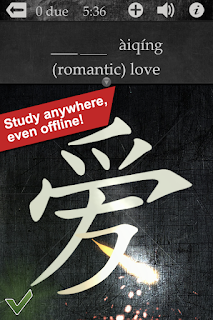FluentFlix, for those who don't know, is the brain child of Alan Park, a lifetime language learner who has spent years working in East Asia. As described on their website:
"FluentFlix is a new way to learn Chinese through authentic video content like music videos, movie trailers, news, and inspiring talks. With engaging and immersive content, we empower users to learn with fun videos exhibiting the diversity and vibrancy of modern Chinese culture."I first discovered FluentFlix through their blog and was hooked from day one. Whether you're looking for learning tips, language learner interviews, or the hottest most up-to-date chengyu, this site has it all. I think real draw was their amazing example sentences and character by character breakdowns on all their Chinese chengyu blogs. Being a huge fan of idioms myself, I look forward to every new post I get from them in my inbox. For an idea of what I'm talking about, just check out "Attention Bachelors- Describing Chinese Beauty" a post from a few weeks back.
I started using FluentFlix a few months back when I was invited to their beta (thanks guys!). While we all await the real launch I thought I would take a moment to give you all a taste of what FluentFlix has to offer.
Videos, videos, and more videos!
Living in Taiwan, I'm delighted to see a wide variety of both Taiwanese and Mainland video clips, giving users a chance to explore slight differences in both accent and vocabulary.
Amazing use of subtitles
These things should be expected of any company trying to deliver video content as a study material, but where FluentFlix really takes things over the top is in how users can interact with the subtitles. Every sentence of every single video on the site has been given its own place marker as you watch. By selecting any sentence in the video, it immediately jumps back to that part of the video (awesome!) and better yet, you can repeat the sentence over and over again to make sure you really get it before moving on.
FluentFlix doesn't stop there, however, a single click on any of the individual words will provide a pop-up definition, by clicking the word again you are taken to a pop-out definition that gives audio reinforcement and AWESOME sample sentences. From there individual words can be added to your video vocab lists so you can go back and study them later.
Once words have been added to your study lists, you can see them appear on the right hand side of the screen, by clicking those words you are taken directly to the sentences in which they appear... super nifty stuff! I'm a huge fan of context based learning, which is something that Fluentflix does amazingly well. As you are watching the video, selected vocabulary words also appear highlighted in the video to focus attention even further.
My Vocab
Once you've studied a video, any vocabulary you stared appears on your homepage where you can review them again with audio and sample sentences, or export them in PDF format for later study. I would love to see other formats, like Excel, available so that you can quickly import to Anki, Skritter or other study decks, but since the site is in beta I'm sure those options will be offered down the road (hint, hint). One thing I was pleasantly surprised about was the option to include sample sentences in the PDF, again, context is key and clearly FluentFlix knows that too!
From the answers on the FAQ page it looks like FluentFlix has a lot more in store for the site, like SRS, quiz and game modes etc. Although the site is only in beta I'm already sold. I can't wait to see what is next for this new language learning tool!
For now, I hope you all enjoyed the quick peek into what I think could be the next big thing in Chinese language learning. The side is still in private beta, so be sure to visit www.fluentflix.com and register as a beta tester today!















